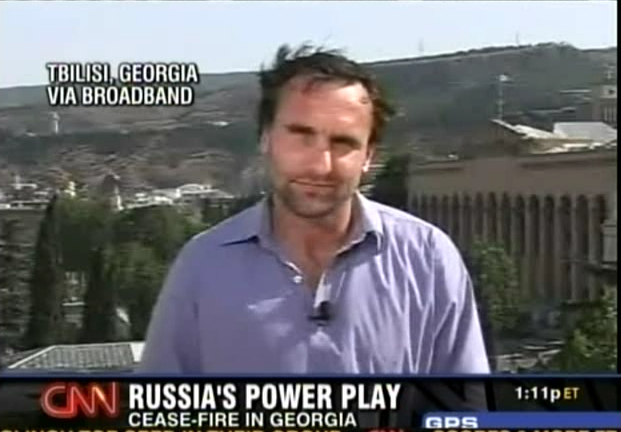GPS: "They sent the message -- to Georgia, to the region, and to Washington --that I suspect they fully intended to do from the beginning."

Length: 3:46
LARGE (44.0 MB) ----- SMALL (4.6 MB)
Michael is back in Tbilisi and appears on GPS. He sums up the events of the past few days by saying that not only did the Russians easily sweep aside the Georgian Army, but the invasion served to send a message from Moscow to the world... and no one has any intention or ability to answer back in any meaningful way.
JILL DOUGHERTY, HOST, GLOBAL PUBLIC SQUARE: And now we want to turn to Michael Ware.
Michael, you know, you are in Tbilisi, and initially there were a lot of fears, apparently, among the Georgians that the Russians would actually try to go all the way to Tbilisi.
Now that we're in this situation, what is the level of fear among the people? And also, what is this, do you think, doing politically or any other way to President Saakashvili?
MICHAEL WARE, CNN INTERNATIONAL CORRESPONDENT, TBILISI, GEORGIA: Well, obviously, Jill, there is some degree of unease amongst the Georgian population. I think -- however, I think that they themselves can see that the situation is beginning to calibrate itself here on the ground.
I mean, to be honest, whilst it's well within the Russians' military capability to take the capital -- where I'm standing right now -- should they so desire, I don't believe that, at the end of the day, the Russians would assess that that would be to their advantage. I think that they would believe -- and, I think, rightly so -- that that would be overplaying their hand. And they don't want to blow the gains that they've made.
I mean, just being purely pragmatic, in the geopolitical scenario that encases this conflict, the Russian military and political operation that's taken place here has been a stunning success. Militarily, on the ground, they swept the Georgian military away, as though they were batting a fly, all but. That Georgia military has tried to rally, but it still offers no real resistance to the Russians.
And of course, no one from Europe, the West or the United States, indeed, can or will come to their aid militarily. And politically, there's very little stick with which to beat the Russians, so, to provide incentives or sanctions to force them to follow the letter of the cease-fire as it stands right now.
But the Russian mission, from Moscow's point of view, you would have to say has been breathtakingly successful. Military, on the ground, as we said, but politically they've sent the message to Georgia, to the region and to Washington that I suspect they fully intended to do from the beginning -- Jill.
DOUGHERTY: And Michael, just quickly, the people that you're speaking to, the Georgians that you're speaking to, are they -- they obviously would be concerned about the Russian side. But are they blaming anyone? Is it all the Russians? Or is there any, let's say, political blame for the president of Georgia?
WARE: Well, right now, I think it's too sensitive of a time for us to begin analyzing that in fine detail.
However, I will say that there is a mood, or there is a question mark over whether this Georgian government, led by its president, did provide any provocation to the Russians.
I mean, there's some talk that there's been goading of the Russian position for several years now, for quite some time, and that maybe some do, indeed, question the wisdom of the military operation launched by the Georgians just over a week ago.
However, the dominant feeling right now, for this moment, is one of nationalism, one of holding together, holding the line. I mean, this country has been invaded by a foreign force. Now is not the time to start pulling apart the leadership.
So, this is a rallying moment for the Georgians.
I'm sure, however, that there will be questions asked in the aftermath, both looking internally inside this country and, of course, externally at Georgia's foreign sponsors, particularly the United States -- Jill.
DOUGHERTY: Okay. Thank you very much, Michael -- Michael Ware, Matthew Chance and Frederik Pleitgen.
